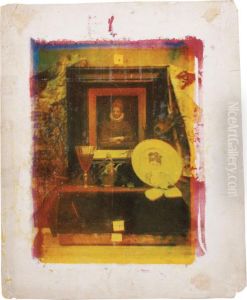Charles Cros Paintings
Charles Cros was a French poet, inventor, and a pioneer in several fields who lived during the latter half of the 19th century. Born on October 1, 1842, in Fabrezan, Aude, France, he was not just a significant figure in the artistic domain but also made notable contributions to scientific and technological advancements. His interdisciplinary talents spanned across various fields, but he is often most remembered for his work in poetry and his contributions to the early development of sound recording.
Cros was a contemporary of the more famous inventor Thomas Edison, and he independently developed a process for recording sound that predated Edison's phonograph. In 1877, he created a design for a sound recording and reproduction machine called the 'Paléophone.' Unfortunately, Cros did not have the financial means to build a working model of his invention. By the time he submitted his idea to the French Academy of Sciences, Edison had already applied for a patent for the phonograph and had a working model, which overshadowed Cros's theoretical contributions. Despite this, Charles Cros is recognized by historians for his groundbreaking ideas in the field of sound recording.
In literature, Charles Cros was associated with the Parnassian movement, a group of 19th-century French poets known for their formalism and attention to form and style over emotion. He was friends with many writers and artists of his time, including Paul Verlaine and Arthur Rimbaud. Cros's poetry is characterized by its wit, technical skill, and sometimes whimsical nature. His works were published in various literary magazines and in collections such as 'Le Coffret de Santal' (The Sandalwood Box).
Cros's curiosity and inventive spirit also led him to work on projects related to photography and telegraphy. He conceptualized a color photography process and was involved in the early development of telegraphic communication.
Despite his various talents and contributions, Charles Cros struggled with financial difficulties throughout his life. He worked in several jobs, including as a medical office clerk and a teacher, to support himself. His life was also marked by personal struggles, including issues with alcohol.
Charles Cros died on August 9, 1888, in Paris, at the age of 45. Although he did not gain the same level of recognition as some of his contemporaries during his lifetime, he is remembered today for his versatile genius and contributions to the worlds of art, science, and technology.
